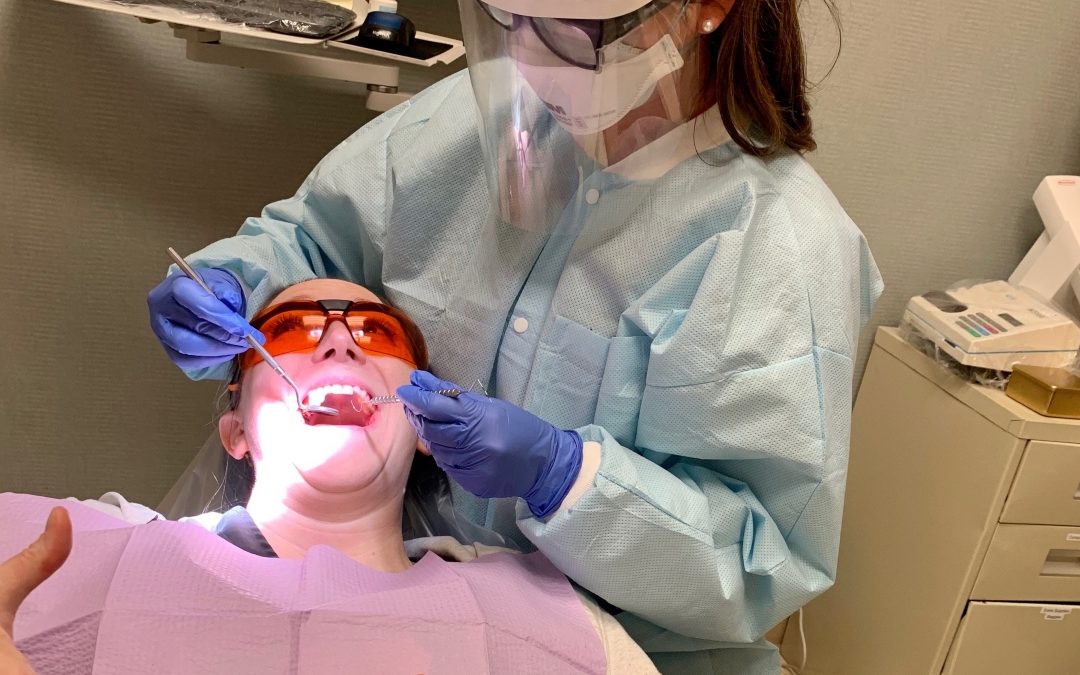Everything has been turned upside down during the global COVID-19 pandemic. The world of dentistry is no exception.
During the spring months, while the pandemic was beginning to take hold in the United States, individuals were advised not to leave home, including visiting the dentist, for fear of spreading the coronavirus. However, with new research and new protocols in place, dental offices are now more important than ever to provide care and prevention to stop the spread of the virus.
It’s been well documented that strategies like social distancing, hand washing, and wearing a mask can make a huge difference in preventing the spread of the coronavirus, but there are other ways to reduce the spread and improve your chances for faster recovery if you become infected.
Reduce the risk of infection
The coronavirus, like all viruses, leads to an infection within your body. While the evidence is still early, new data suggests that particular periodontal pathogens (disease-causing agents that lead to periodontitis, or gum disease) may contribute to an overabundance of pathogens circulating within those who have severe COVID-19 infections. This leads to what medical professionals refer to as a superinfection.
This superinfection can make an already dangerous situation much worse. According to RDH magazine (a professional publication for dental hygienists), studies have shown that nearly 80 percent of patients admitted to an intensive care unit with COVID-19 have extremely high bacterial loads and at least one of these studies showed that over 50 percent of patients whose deaths were caused by COVID-19 also had superinfections to the point they needed antibiotics.
From an oral health perspective, these risks associated with periodontal pathogens can be combated through routine dental hygiene and preventive care with a dental health professional.
Prevent and/or combat underlying conditions
Another area where COVID-19 poses an increased risk is to patients suffering from underlying conditions. Individuals with conditions like type II diabetes, obesity, hypertension, and heart disease are all at an increased risk if exposed to and contract the coronavirus.
Preventative oral care can play a significant role in either preventing or addressing these underlying issues by decreasing the potential for infection that begins with your teeth.
Saliva acts as a protective shield against infection
In an article published in the journal Oral Diseases, saliva’s importance in preventing infection is highlighted by research showing hyposalivation (reduced saliva production) as a potential risk factor for contracting COVID-19.
Saliva is a complex fluid filled with virus-fighting proteins and peptides. That means the saliva in your mouth plays a part in preventing infection by acting like a virus shield, including against types of coronaviruses (according to previous studies). For those suffering from hyposalivation, or other conditions that cause a reduction in saliva, other studies have shown these patients are at an increased risk for contracting respiratory infections because the reduced saliva secretion may result in a decreased secretion of antimicrobial proteins and peptides.
“Dentistry is not an elective procedure…”
This quote comes from a Washington Post interview with Purnima Kumar, a professor of periodontology at Ohio State University. Dr. Kumar goes on to say, “They’re important to your mouth health, as well as to the health of the rest of your body.”
In March, the Centers for Disease Control recommended that dentists only conduct emergency procedures. Since then, however, the role dental health plays in combatting the pandemic has led to less restriction on dental offices.
Dental offices are designed to combat infection
Dental offices, by their nature, have always been areas where infection can occur. Medical procedures within someone’s mouth leave hygienists, dentists, and patients vulnerable to viruses that a person has picked up in their daily life.
Therefore, dental offices have virus prevention built into every single procedure. Bill Miller, an epidemiologist, and physician at Ohio State University, also told the Washington Post, “Dentists are accustomed to be thinking about infectious-disease risk. They’re already taking precautions.”
Personal protective equipment, or PPE, is also central to how dentists and hygienists already operate within their daily responsibilities. Regular cleaning and disinfecting is also core to the routine operations that happen multiple times a day inside a dental office.
Appointments have changed, so please be adaptable
But even with virus prevention as a cornerstone to how dental and oral care is provided, we’re still taking increased measures to protect you and your family while you trust us to take care of your oral health.
These changes include screenings before your appointment to establish if you are showing symptoms of COVID-19, social distancing measures between patients, an increased amount of time between appointments to reduce the number of patients in the waiting room, and the removal of books and magazines from the waiting room. You will also be asked to sanitize your hands when you enter the building.
Care for your oral health with University General Dentists
The global coronavirus pandemic has turned life on its head for people all over the world, and we’ve had to adapt just like so many of you. But we’re committed to providing the care you need to keep you and your family safe. At University General Dentists, we believe strong oral health leads to stronger overall health. So as we all do our part in the fight against the coronavirus, remember the dental health professionals at University General Dentists and dental offices across the country are critical to preventing and combating COVID-19.
The doctors, hygienists, and staff at University General Dentists are proud to provide family dentistry services to help keep your loved ones’ smiles healthy and strong. We believe in caring, attentive, and respectful dental care for your entire family, and we provide everything from routine checkups to extensive dental repairs with the latest state-of-the-art technology. We have two convenient Knoxville dentist locations. Schedule an appointment at our University of Tennessee Medical Center office at 865-305-9440 or our West Knoxville office at 865-500-5700.

